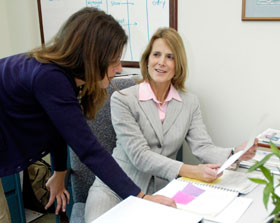  |
| HOME | THIS ISSUE | CALENDAR | GRANTS | BACK ISSUES | < BACK | NEXT > |
Students in Early College Experience earn UConn credits at high schoolsby Scott Brinckerhoff - October 31, 2005 |
||||
|
Each week during the school year, 3,500 students at 110 high schools across Connecticut enter classrooms where they take college-level courses in everything from art to statistics. The students are part of a 50-year-old UConn program called Early College Experience, or ECE. The program, which began with 68 students at seven high schools, gives students several benefits. They earn college credits accepted at UConn and most other schools, while learning what a college-level course is like. A course costs only $25 a credit, compared with $200 a credit for an in-state UConn student. “The experience was definitely good,” says Diane Pacini of Glastonbury, who went on to study nursing at UConn. “I’m grateful that I took these classes because I had 24 extra credits as a freshman and didn’t have to take classes during the summer.” Another former student now at UConn, Lauren Bubela of Torrington, says her credits let her focus more on subjects she wanted to pursue at the University, instead of those that were required but “might not be at the top of my list.” “Over the years, the program has evolved from one for college-bound high achievers to one that is available to students who may not even be sure they are going to go to college,” says Brian Boecherer, assistant director. For many students, the exposure to UConn freshman-level coursework can be a key step toward a major and even a career, Boecherer says. They are also able to acquire a taste of the college experience in a familiar environment without the usual freshman stresses, he adds. Director Gillian Thorne says ECE differs from Advanced Placement in many ways: UConn faculty members certify high school teachers as adjunct professors for ECE, for example, and they stick to the UConn curriculum, whereas AP classes are centered around a test. Not all students, of course, spring from a UConn course into a related major or career. Some students take a challenging course, do well, and then decide to pursue something unrelated, says John Duffy, a calculus and physics teacher at Torrington High School who has a background in mechanical engineering. “One of the best math students I ever had was a young lady who earned eight credits and announced she was happy to have gotten her college math out of the way because now she could concentrate on theater and music. And that’s what she did,” Duffy says. The courses are taught by high school teachers who use UConn material and give the same test as a first-year student would take at any UConn campus. UConn faculty like Cecile Hurley in chemistry and Jim Hurley in math, work with their high school counterparts to maintain the integrity of the program.
Earlier this year, the Hurleys won Faculty Coordinator Awards for excellence in curriculum and adjunct faculty development for their many years of work with the program. In addition to being certified by UConn counterparts, high school faculty attend annual workshops to keep their skills honed. “We try to give the students the same information and experience they would receive here,” Cecile Hurley says. For the two-semester general chemistry course, which is taught at about 27 schools, her department sometimes lends equipment or provides re-agents for use in experiments. Students can also draw on many of the resources available to any UConn student, such as HuskyMail, study tips, and advice on exam preparation. Departments such as chemistry also maintain an electronic bulletin board where students can compare notes with peers around the state, or check quiz answers or other material related to the course. “We monitor it so it doesn’t become a dating service,” says Hurley. Torrington’s Duffy, who also won an award for his participation in the program, is an enthusiastic supporter. During his 17 years with the program, he’s taught several hundred students in the UConn calculus course. They come from across the socioeconomic spectrum, he says. If a student with limited means wanted to take the course but balked at the expense, “we would find a way to cover the cost,” he says. Boecherer, the assistant director, has personal experience with the Early College Experience program. He took part in it as a high school student at Norwich Free Academy before coming to UConn. “I took my first test and bombed out,” Boecherer recalls. “I went to my teacher to drop the course but he wouldn’t let me. He told me to work harder. He said if you take one bad test, you don’t get out. You learn how to study.” |
| ADVANCE HOME UCONN HOME |

